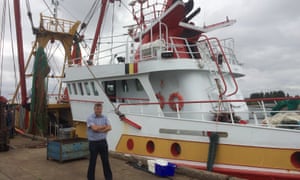Nyheter
So long and thanks for the fish: EU trawlers set new course post-Brexit

Amid prolonged political wrangling, families fishing in UK waters for decades are forced to reassess.
The Beernaert family has been catching sole, turbot and monkfish in north-western Europe for at least three generations. But, because of Brexit, decades of seafaring could soon come to an abrupt end.
Benoit Beernaert, the owner of the Mare Nostrum trawler, makes half his annual catch in UK waters. And nobody knows whether his boat can continue to fish those seas after 31 October.
“If I lose half my fishing ground why should I invest? It could be better to finish,” he said. Feelings don’t come into it: “I would finish, rather than go bankrupt. It’s a rational decision, it’s not an emotional decision.”
The uncertain future of Mare Nostrum (Latin for “our sea”) is a microcosm of the threat facing Belgium’s 65-strong fishing fleet, which also catches half its fish in UK waters.
Adding to the anxiety is the sharper tone from London, after the arrival of Boris Johnson as prime minister, who has pledged “do or die” to quit the EU on 31 October.
“We feel that in Downing Street there is a hardline government,” Beernaert said. No-deal Brexit was “the most disturbing issue of all: there is no clear or clean answer”.
The mess room of the Mare Nostrum, moored at the Belgian port of Zeebrugge for engine maintenance, is a snug, spare wooden space, with formica tables where the crew of six eat their meals at sea. The Mare Nostrum and its staff spend half the year in British waters. The ship cannot fish inside the UK’s 12-mile exclusive economic zone, so it never gets too close.
Thirty-five species including sole, brill, ray, cod and haddock are trawled from the seabed, gutted on a deckside conveyor belt, and packed in ice-laden crates in the zero-degree chill of the fish hold.
With its 67km strip of blustery coastline along the North Sea, Belgium has one of the EU’s smallest fishing fleets, but is proud of its seafaring tradition. Flemish fishermen have been hunting these seas, long before the state of Belgium was created in 1830.
Emiel Brouckaert is the chief executive of Rederscentrale, the Belgian fishing industry organisation. During the second world war, his grandfather – like Beernaert’s – came to England as a refugee, and settled in the Devon fishing town of Brixham. As fishing was a reserved occupation, the Belgians fished the surrounding waters to put food on the country’s tables.
“The future of fisheries in the UK and in Belgium will always remain intertwined,” Brouckaert said. If the UK leaves the EU without a deal, he believes it would not take long before talks resume about reciprocal fishing rights.
“There needs to be a form of cooperation, there needs to be a form of reciprocal access,” he said.
Yet fishing is one area in which the EU stands to lose more from Brexit than the UK. Under the common fisheries policy, EU-based fleets land about eight times as much fish in UK waters as British fishermen do in EU waters – a “poor deal” says the UK government, which has promised to overhaul the current system.
The politically-charged topic is also being deployed by Westminster, as it bids to re-open the Brexit withdrawal agreement. Ministers urging Brussels to rethink its refusal to renegotiate the exit deal have cited the Belgian fishing industry as one example of how the EU will be damaged by a no-deal Brexit.
Fishing industry groups around the North Sea are aware of the threat. Soon after the 2016 referendum, they formed a special lobby group to speak for their interests, the European Fisheries Alliance (Eufa).
“We are more dependent on UK waters than vice versa,” said Gerard van Balsfoort, the chair of Eufa, who called suggestions that British fishermen had got a bad deal in the fish quota negotiations of the 1970s and 80s “a myth”.
Eufa estimates that failure to reach a long-term deal on reciprocal fishing rights would cost 6,000 jobs in catching, processing and selling fish in the participating countries. While that could devastate coastal villages, fishing is a small part of the EU economy, raising concerns it could get sidelined in Brexit talks. “We are a relatively small sector compared to chemicals, IT, so we didn’t want to be a pawn in any negotiation,” Van Balsfoort said.
The message has hit home. The French president, Emmanuel Macron, has called fishing rights a “lever” to ensure the EU gets what it wants from the future trading relationship. The EU’s 2018 guidelines for negotiating a trade deal spell out that zero-tariffs on goods should be tied to maintaining current access to waters – an opening bid deemed outrageous by British negotiators.
Europe’s dependence on British waters is balanced by the UK’s desire to sell seafood to the EU. Two thirds of fish caught by British boats – often valuable seafood, such as prawns, mussels and lobsters – are exported to EU countries. If the British fishing industry is going to thrive, it needs continued access to those markets.
From November, the Mare Nostrum will not be sailing the Channel for its usual autumn voyage. Beernaert will instead head to Danish waters.
“We have been thinking for the last two or three years whether we could have other fishing grounds,” he said. “But where else do you go? There is no possibility left.”
Källa: The Guardian



